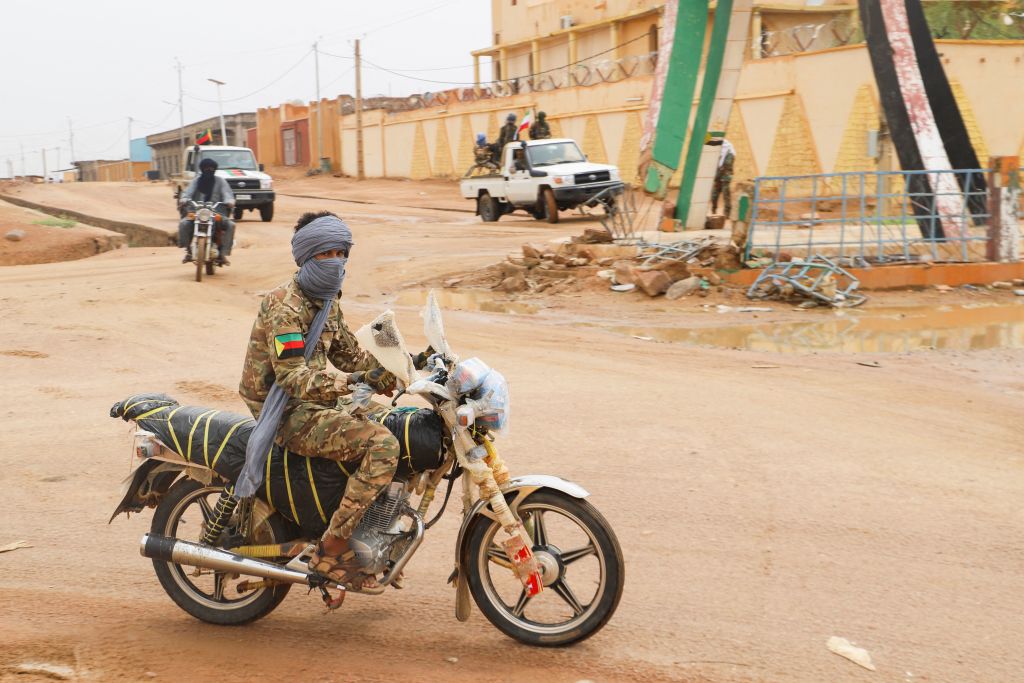Across the Sahel, the buzz of a motorcycle engine has become a sound that inspires fear.
Motorcycles have become the vehicle of choice for terrorists across the region, allowing them to move quickly, strike suddenly, and avoid capture by the local authorities.
“Motorbikes have been a near-constant presence in Sahelian armed groups’ battlefield operations, with swarms of motorbikes allowing tens, or even hundreds of fighters to rapidly descend on a target location,” researchers with the Global Initiative Against Transnational Organized Crime (GI-TOC) wrote in a 2023 report on motorbike use among Sahel terror groups.
The appeal of motorbikes is simple, according to GI-TOC researchers — they’re suited to the region’s sandy, unpaved roads, more fuel-efficient than cars and easier to repair.
The report found that motorcycles have become one of the most highly trafficked items in the Sahel. They are indispensable to the violent extremist armed groups, particularly where the Sahel borders Benin and other coastal states to the south, the report notes.
In recent months, terrorists with Jama’at Nusrat al-Islam wal-Muslimin (JNIM) and Islamic State West Africa Province have killed dozens of Soldiers and civilians across the Sahel during motorcycle-mounted raids on military bases and communities.
In June, for example, several hundred armed men, many on motorcycles, attacked a Nigerien Army base near the border with Mali, killing at least 34 Soldiers and wounding 14, according to Niger’s Defence Ministry.
In August, armed men on motorcycles killed 11 people and kidnapped 70 more in a village in Nigeria’s northwestern Zamfara state bordering Niger.
“They came on motorcycles, shooting randomly before abducting our daughters and children,” Isa Sani, a resident of the community of Sabongarin Damri, told Reuters.
Other motorcycle-borne attacks by JNIM in the Sahel this year included 30 Soldiers killed in Benin, more than 50 people near Kobe in Mali, 44 worshippers in Niger’s Fambita, and 200 troops at Burkina Faso’s Djibo military outpost.
Terrorists’ growing use of motorcycles has turned the vehicles from a sign of prosperity to a symbol of violence and threat. Benin resident Iliyasu Yahuza discovered that firsthand when he brought his motorcycle to his rural community, Brignamaro, in northern Benin. Previously, the motorcycle attracted the attention of excited children, he said. Now, those same children run away. Yahuza, a trader, worries about how the motorcycle is affecting his own reputation.
“People have begun seeing me as a member of the armed group launching attacks in this region,” Yahuza told Al Jazeera. “I no longer feel secure riding a motorbike.”
Civilians like Yahuza are also at risk of having their motorcycles stolen by terrorists, an act that can devastate lives and livelihoods, GI-TOC reported.
“Motorbike theft in the Sahel is often violent in nature, and it has hugely damaging economic consequences for citizens,” the report states.
Earlier this year, Burkina Faso announced its forces had seized 900 motorcycles and 164 motorized tricycles near a border crossing with Côte d’Ivoire. The vehicles were headed to Korhogo, where they would be sold to finance terrorism, Burkinabe authorities reported.
The confiscated vehicles were given to Burkina Faso’s security forces in their fight against terrorists, Burkinabe Minister of Security Mahamadou Sana said in a statement.
In northern Benin, Tanguita resident Junaidu Woru told Al Jazeera that terrorists’ use of motorcycles means civilians need to find other transportation options.
“Innocent people should avoid using those bikes for their own safety,” Woru said. “Because when an attack happens, and an innocent person drives around the area at that particular time, they can be mistaken for a militant.”

